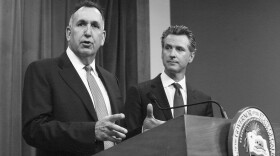In a speech billed as his last major public address, Minister Louis Farrakhan, ailing leader of the Nation of Islam, lambasted the Bush administration's foreign policy.
Farrakhan was speaking Sunday night to tens of thousands of Nation of Islam members in Detroit, where the movement began.
"God is angry because of the ideas of neoconservatives," Farrakhan said. "Many so-called Jews and Christians have accepted the philosophy of an imperialist America, even without any aggression or provocation."
With all the drama and rhetorical flair his audiences have come to expect from him, Farrakhan told the crowd to turn its back on the war in Iraq and what he called the false promises of military recruiters.
Farrakhan recently underwent surgery for complications from prostate cancer. And even though many within the Nation were hesitant to call this a good-bye speech, Farrakhan himself, his voice quivering, said it was just that.
"My time is up. The final call can't last forever."
That's a difficult message for some loyal followers to hear. Minister Jeffrey Muhammad has been a member of the Nation for 17 years and works in the group's Chicago offices. For him, and many people at the speech, Farrakhan represents much more than a spiritual leader.
"Minister Farrakhan is a living example for me of how to be a father, of how to be a brother, of how to be a man, of how to be a man striving to life his life right," Muhammad said.
Muhammad said the message keeps attracting followers. It's hard to gauge membership in the group, which insiders describe as a religious movement with a political and economic agenda to improve the condition of blacks in America.
But many credit Farrakhan with breathing new life into the Nation of Islam in the early 1980s. His greatest public success was the Million Man March in 1995, when hundreds of thousands of African-American men flooded Washington, D.C., in a powerful act of solidarity. That never could have happened without Louis Farrakhan, says one of his biographers, Arthur Magida.
The Nation of Islam "has thrived, ever since its founding in the 1930s by Elijah Muhammad, on a single charismatic authority and someone whose enunciations and edicts you don't breach," Magida said. "There's nobody right now within the nation who can muster that same kind of aura that Louis Farrakhan does. Nobody comes close."
So a big question remains: What happens to the Nation of Islam now that Farrakhan is stepping away?
"If the principles that he taught us from the Hon. Elijah Muhammad have been internalized by the brothers and sisters who make up the Nation of Islam, then when God takes [Farrakhan], this struggle will go on," said Akbar Muhammad, the Nation of Islam's head of international affairs.
A successor to Farrakhan hasn't been named yet. But as he spoke for more than an hour, on his feet, the 73-year-old appeared vigorous. In his final remarks he said he doesn't see expiration in his future, but rather exultation.
Copyright 2023 NPR. To see more, visit https://www.npr.org. 9(MDAzMjM2NDYzMDEyMzc1Njk5NjAxNzY3OQ001))






